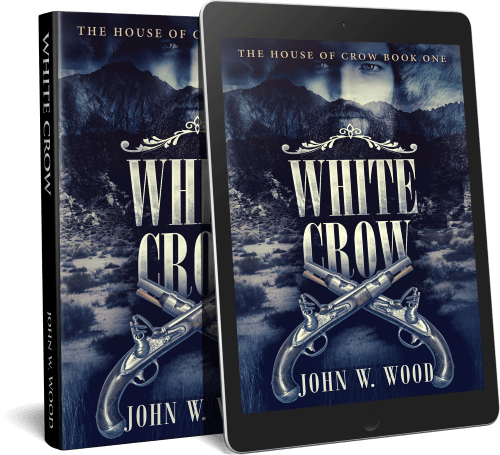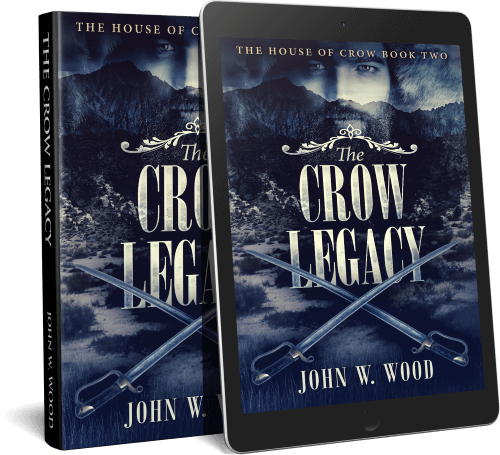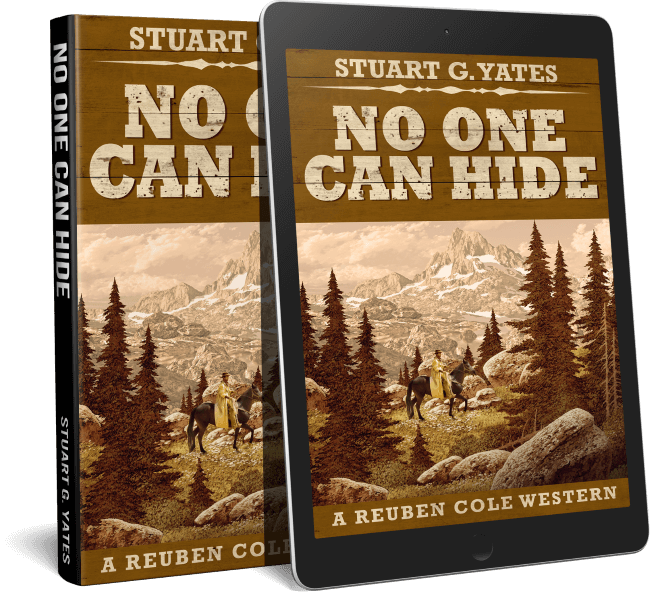The House Of Crow
Book excerpt
San Francisco, Present Day
The heavy armor of the black limousine muffled the sounds of the outside world to its four occupants. The driver and a bodyguard rode up front, separated from their two charges seated in the back, by a sliding glass partition. In the back of the limousine, Sixty-year-old William Crow looked over at his nephew, Marine Captain Charles Crow. At twenty-five, Charles was an athletic six feet tall. His thick black hair was clipped high and tight in Marine fashion. Though handsome, the most noticeable feature one noticed was his intense blue eyes, a family trait. Charles was gifted, as most of his ancestors had been, with a high degree of intelligence and near perfect hand-eye coordination. Charles had graduated in the top five percentile of his class at Annapolis. The Marine Corps’ upper echelon had their eyes on him.
Charles’ mother, Jennifer, had just died after a long illness. They had attended her funeral that very morning. William silently gazed out the dark-tinted window, watching the traffic and buildings of San Francisco pass by. It was his duty to inform Charles that he was now a major stockholder of Corvidae Enterprises. One of those enterprises was Corvidae Security, or as one son-of-a-bitch had dubbed them, "The Whores of War." William thought of Corvidae as peacekeepers for hire. They often protected heads of state in war zones and had stood guard when a new nation’s populous went to the ballot box for the first time. At this moment, they were providing protection for American convoys, freeing the US military to fight in Iraq, where Captain Crow had just finished his second tour.
The limo slowed, and then pulled into a long, brick-paved driveway leading to a nineteenth-century Victorian home. Two men, appearing to be gardeners, lay down their tools and moved parallel with the car. Stopping at the front entrance, the limo driver got out and moved back to William’s door to open it. One of the gardeners opened the opposite side door for Charles. William spoke to the bodyguard, gave a wave to the gardeners, and stepped around to Charles. “It’s been a long day. Let's get you settled, and then we’ll have something to eat.
Inside the house, Charles followed his Uncle to a door at the end of a long, wide hallway. William turned the knob, and the heavy door opened smoothly into a suite of three furnished rooms. “This is yours for as long as you wish to use it, Charles. At one time, this was your great grandfather’s office. It’s gone through many changes since then, but I think you’ll find it comfortable.”
Charles walked to the green marble fireplace where a sword with an ivory hilt and matching scabbard hung above the mantel. Above the sword hung a double-barreled shotgun with large hammers. The short ten gauge barrels looked like dual cannons. A piece of black ebony, carved into the image of a crow in flight, was inlaid into the stock.
“Where did you get these Uncle Bill? That’s a real Mameluke sword! I have a similar one, issued to me by the Marine Corps, for parades.”
“They belonged to your Great Grandpa, Jedadiah Crow. The sword is an original Mameluke given to him by a Marine, and the shotgun belonged to an outlaw.”
Charles turned to his Uncle, “An outlaw?”
“Your Great Grandpa Jed was a lawman back in the 1800s. That shotgun wounded him twice and saved his life a couple of times. Now let’s get you settled. Supper is at six. We can talk later.”
Later, after supper, they moved to the living room. Uncle Bill lit his pipe and offered Charles a brandy.
“Do you have a beer? I have a real taste for a cold one.”
Bill pressed a button near the fireplace, and a manservant came into the room. “Sir?”
“Bring Charles a glass of Heineken.”
The beer arrived in a frosted glass with a thick head of foam. Charles took an appreciative swallow and then saluted his uncle with the glass as he wiped the foam from his upper lip.
“Charles, I have some things to tell you that will surprise you, and may even make you angry. However, I want you to know that what we did, right or wrong, was done out of love for you.”
Charles’ blue eyes became serious as he settled back in his seat.
“Charles, you are now a wealthy man. When your mother died, you inherited immense wealth; and with that, responsibility, should you choose to accept it. As you know, your father died when you were just a baby.”
“Yes, he died at sea," responded Charles. "Mom told me.”
“Charles, your father, was killed while leading an attack on pirates."
Charles mulled it over in his mind quietly, trying to absorb what he had just heard.
“When your father was killed, your mother asked me not to discuss your father or the family with you. Her fear was that you would follow in his footsteps and get yourself killed. Her wish was for you to go to college and become your own man.”
“What was my father involved in that frightened my mother so much that she would lie to me? I grew up thinking he was an executive for a shipping company.”
“Your father and I owned, and now, you and I own that shipping corporation. It’s been in the family for over 120 years. We also own several other enterprises. We’ve had a business presence in China since before the Boxer Rebellion. Corvidae Enterprises has branches around the world. We’ve developed great influence here in the States and with several foreign governments over the years. It’s time you learned who you are. Then you can make your own decision as to what you want to do.”
“Tell me about my father and why my mother was so afraid of him.”
“First of all, your mother had no fear of your father. She loved him with all her heart. She fell in love with him thinking she could deal with who and what he was, but she found she couldn’t. She was afraid of what he was, not who he was. That’s why she left him. I think for you to understand, I need to start at the beginning. Through word of mouth and a great deal of research, we think it all began in Ireland in the early 1800s with a man named Brian Pringle."
Ireland, 1816
When you met Brian Pringle, the first thing you noticed was his piercing blue eyes; eyes that could beguile or make a man look away. Brian Pringle, well-known for his fighting abilities, had a price on his head. That came about when two drunken soldiers of His Majesty’s Royal Army tried to have some sport by poking him with their bayonets. Brian took the first unexpected thrust in his arm. His immediate response was to wrench that musket away from his attacker, then smash his attacker’s head with the butt-end. When the second soldier tried to avenge his friend by shooting Brian, Brian threw the dead soldier’s musket and bayonet like a spear, killing him also.
The Pringle Clan gathered in council and convinced Brian that he and his new wife should escape to America.
Now, three years after arriving, Brian and his family were on the great plains of America looking for a place to settle. Brian walked alongside the oxen, guiding them with his walking-staff. His wife, Elizabeth, sat in the back of the covered wagon with their two-year-old son, Little Brian. Brushing the hair from her face, she smiled as her son struggled to open a small wooden box. She kept her ‘bits of precious’ in that box which included a cross Brian had given to her. It was a Celtic cross made of silver, engraved on the back, 'E. Pringle'. Elizabeth reached to take the box from Brian when he managed to open it and scatter the contents. “Oh, Brian, you must be careful! Now help me pick these up.”
A short distance from the wagon, hidden in a fold of land, a war party of Blackfoot warriors watched the travelers. With a hand signal from the Indian leader, the raiders broke the silence with their war cries. The pounding hooves of their war ponies shook the ground as they charged.
Brian desperately tried to get his musket from the wagon, but it had become wedged under the seat. He heard a shot from the back of the wagon as Elizabeth, protecting her son, met the challenge. Unable to retrieve his musket, Brian with a Celtic war cry swung his heavy walking staff knocking an Indian from his mount. Another well-placed strike of the staff cracked the warrior’s skull. Brian sagged as an arrow struck him in the thigh. Regaining his footing, he struck a mighty blow with his staff to the forelegs of a passing war pony. The pony stumbled, sending the rider over its head. In fear and agony, the pony danced around stomping the fallen warrior.
When Elizabeth heard the war cries, she’d pushed Little Brian to the floor of the wagon and grabbed her musket. A warrior tried to jump in the wagon. She shot him in his painted face. No time to reload, she grabbed an axe they kept in the wagon; but an arrow struck her in the back. Mortally wounded, Elizabeth fell forward on top of Little Brian. The last thing she saw was her silver cross in the small hand of her son.
It was not a good day for the Blackfoot raiders. They’d lost three braves and a war pony. Now, from out of nowhere, came a band of Crow, the enemy of the Blackfoot. The Crow made short work of the Blackfoot warriors who were intent on plundering the wagon.
The Crow leader found Elizabeth and the lifeless warrior in the back of the wagon. He spied the small hand of Little Brian protruding from under his dead mother, clutching the silver cross. Roughly, he pushed Elizabeth’s body aside with his foot. Little Brian now covered in his mother’s blood, stared up at the Crow warrior with his father’s eyes.
The Present
“It must have been his eyes," said Uncle Bill. "That and the fight his parents put up because they took Little Brian with them. The Crow warrior took him into his family and raised him as his own. They called him White Crow. He grew big and strong like his father, Brian, must have been. He became a Crow warrior known for his courage and horsemanship. They say he could ride and shoot without equal.
“Then one day, a Mountain Man named Yahoo Putnam came to spend the winter with the tribe. White Crow’s life would be forever changed.”
Crow Indian Village
The winter wind whistled across the smoke-hole of the tipi, rattling the hide-walls against the lodge poles. Buffalo robes covered the floor. The flickering yellow firelight cast a moving shadow of a man on the walls of the tipi. Yahoo Putnam sat cross-legged as he worked on a broken trap. The slightest bump and it would snap shut. Putnam looked up from his work when wind, snow, and an Indian came through the tipi entrance. The young brave was handsome with thick black hair; his hair was so long that it was held in a net hanging down his back. Putnam eyed the rabbit held in the Indian's hand and smiled.
“What you got there?” He asked.
“White Crow gives to you,” he said, handing the dressed rabbit to Putnam.
“Well set yourself down. I'll stick this critter on the fire. You’ll stay and eat?”
White Crow answered with a flash of teeth in a broad smile. Dropping his buffalo robe to the floor, he squatted by the fire. His blue eyes watched Putnam’s every move as the Mountain Man prepared the rabbit for the fire.
As Putnam worked, he watched the boy. This was the first time he had wintered with this tribe. He’d heard about the white Indian from other trappers but shrugged it off as just another tall tale told around the fire.
While the rabbit cooked, Putnam again began to fiddle with the trigger of the trap. White Crow watched as Putnam set the trap and placed it on the floor. Taking a stick, he poked the trap from the side. When nothing happened, he poked the trigger, and the jaws snapped shut on the stick.
“That ought-a get it,” he said, as he removed the stick from the jaws. Handing the trap to White Crow, he said, “Here, put that in the sack with the others.”
White Crow took the trap and pulled the sack to him and placed the trap into the bag. There were now sixteen traps inside, cleaned and ready for the spring season. He pulled the drawstring tight and then pushed the bag upright. That’s when he saw the thick book with water stained covers. The covers had once been black, but wear and moisture had turned them a dirty gray. White Crow opened the book. On a page, he saw a drawing of a boy dressed in a loincloth, his arm pulled back, a sling whirling over his head. At the feet of the boy lay a pile of armor, in front of him stood a giant dressed in full armor, with a spear and sword. White Crow looked up at Putnam questioningly.
“That’s David and Goliath,” said Putnam. “See the armor? The king, David’s chief, gave him armor to fight the warrior Goliath, but David didn’t use it. He said the Great Spirit would protect him. That’s a sling he’s using. It can throw a rock like a bullet. He killed Goliath with it, and the enemy ran away.”
“He was a Dog Soldier?" asked White Crow.
“Well, no, he was a shepherd; a boy who protected the tribe’s sheep. He had a vision that told him to fight, and that he would win a great victory and become chief.”
“What are these?" asked White Crow, pointing at the words.
“Those are words, they tell the story. Here let me show you. ‘And David went down to the river and selected five round stones and placed them in his pouch.’”
“They say that?"
“Yes, here." Putnam placed his finger under each word as he read.
“You will show me how this is?” asked White Crow.
“So you want me to teach you how to read, do you?”
The blue eyes fixed on Putnam’s face, “Yes, teach me to read.”















Praesent id libero id metus varius consectetur ac eget diam. Nulla felis nunc, consequat laoreet lacus id.